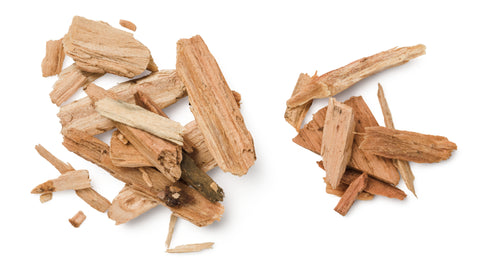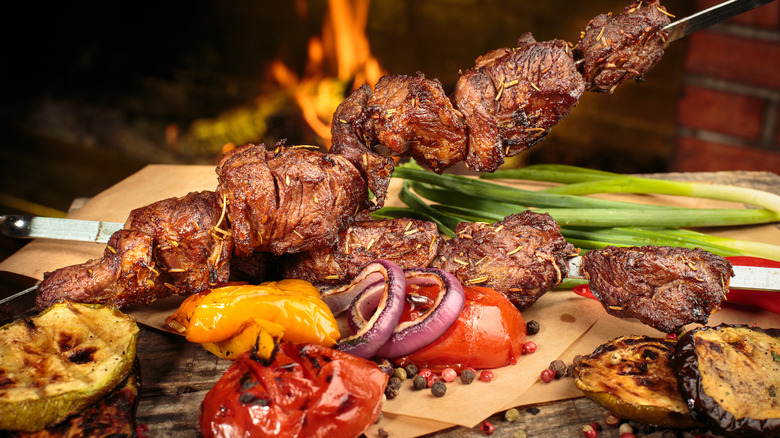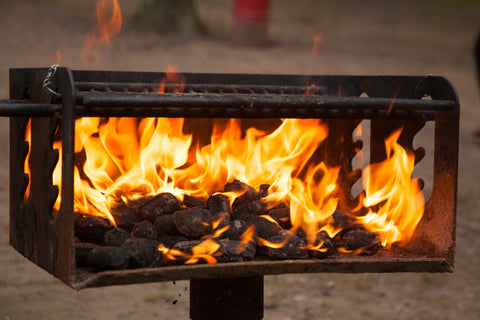
Introduction
The Age-old Debate: Charcoal Vs Wood For BBQ
In the world of barbecue, the debate between charcoal and wood grilling has been ongoing for years. BBQ enthusiasts have their own preferences when it comes to the fuel source they use, with some swearing by charcoal and others loyal to wood grilling. Both methods have their merits and it truly comes down to personal preference.
Understanding The Importance Of Fuel Choice In BBQ Flavor
When it comes to grilling, the choice of fuel can have a significant impact on the flavor of the food. Charcoal grilling involves using either charcoal briquettes or lump charcoal as the primary fuel source. These charcoal options provide a consistent and steady heat, making them ideal for grilling. The flavor from charcoal comes from the release of volatile compounds during the cooking process.
On the other hand, wood grilling involves using actual pieces of wood as the fuel source. Different types of wood, such as hickory, mesquite, or oak, can impart distinct flavors to the food. The smoke from the burning wood adds a unique smoky taste that is cherished by many barbecue enthusiasts.
In the debate between charcoal and wood grilling, it ultimately boils down to the flavor profile one prefers. Charcoal grilling offers a consistent and reliable heat source, while wood grilling provides a distinct smokiness. Each method has its own loyal followers, each one swearing by their preferred method. So, when it comes to choosing between charcoal and wood grilling, it’s a matter of personal taste and the flavor experience one desires.
The Battle Of Charcoal
Pros Of Using Charcoal For BBQ
- Flavor: Many BBQ enthusiasts argue that charcoal grilling provides a more well-rounded flavor compared to gas grilling. The charcoal releases volatile compounds during the cooking process, adding a unique smoky taste to the food. The steam created by the dripping juices also adds extra flavor and a tantalizing sear on the meat.
- Temperature control: Charcoal grills allow for precise temperature control, making it easier to maintain the ideal temperature for grilling. This is particularly important when cooking delicate foods like seafood or vegetables.
- Versatility: Charcoal grills can be used for both direct and indirect grilling. Indirect grilling involves cooking the food away from the direct flame, allowing for more even cooking and preventing flare-ups. This versatility is appreciated by BBQ enthusiasts who enjoy experimenting with different cooking techniques.
Cons Of Using Charcoal For BBQ
- Longer preheat time: Charcoal grills take longer to heat up compared to gas grills. It usually takes about 20-30 minutes for the charcoal to reach the desired temperature, which can be inconvenient if you’re looking for a quick grilling session.
- Ash cleanup: After grilling, charcoal grills require cleaning up the ash and disposing of it properly. This extra step adds to the overall maintenance time and can be seen as a disadvantage for those looking for a hassle-free grilling experience.
- Smell: Some people find the smell of charcoal to be overpowering and unpleasant. This can be a drawback for those who prefer a more subtle aroma when grilling.
In conclusion, charcoal grilling offers a unique flavor profile, precise temperature control, and versatility, making it a popular choice among BBQ enthusiasts. However, it does require a longer preheat time, ash cleanup, and some may find the smell overpowering. Ultimately, it comes down to personal preference and the desired grilling experience.
The Charm Of Wood
Advantages Of Using Wood For BBQ
- **Enhanced flavor**: Wood grilling imparts a distinct and intense smoky flavor to the food, which is revered by many BBQ aficionados. Different types of wood, such as mesquite, hickory, or applewood, add their unique flavor profiles, allowing for endless experimentation and customization.- **High heat output**: Wood generates higher temperatures compared to charcoal, making it ideal for searing and achieving that coveted charred crust on meats. This makes it a suitable choice for grilling thick cuts of meat or achieving a crispy skin on poultry.- **Natural and eco-friendly**: Wood is a renewable resource and is considered more sustainable than charcoal. It produces less carbon emissions, making it an environmentally friendly option for those conscious of their ecological impact.
Disadvantages Of Using Wood For BBQ
- **Soot and over-smoking**: Some types of wood, particularly softwoods like spruce, can leave an unpleasant sooty residue on the meat. Care must be taken to select suitable wood types to avoid this issue. Additionally, using too much wood or leaving the food on the grill for too long can result in an overpowering smoky flavor that may mask the taste of the meat.- **Less temperature control**: Compared to charcoal grills, wood grilling requires more skill and experience to regulate and control the heat. It can be challenging to maintain consistent temperatures, which may affect the cooking of delicate foods.- **Higher learning curve**: Wood grilling demands more attention and practice to master compared to charcoal grilling. It requires understanding the characteristics of different woods, adjusting the amount of wood used, and managing the smoke levels to achieve desired results.
In summary, wood grilling offers a unique and intense smoky flavor, high heat output for searing, and eco-friendly attributes. However, it may result in sooty residue and overpowering smoke if not used correctly, requires skill to control temperatures consistently, and has a steeper learning curve. Ultimately, the choice between charcoal and wood grilling depends on personal preference and the desired flavor profile for the BBQ experience.
The Charm Of Wood
Advantages Of Using Wood For BBQ
- **Enhanced flavor**: Wood grilling imparts a distinct and intense smoky flavor to the food, which is revered by many BBQ aficionados. Different types of wood, such as mesquite, hickory, or applewood, add their unique flavor profiles, allowing for endless experimentation and customization.- **High heat output**: Wood generates higher temperatures compared to charcoal, making it ideal for searing and achieving that coveted charred crust on meats. This makes it a suitable choice for grilling thick cuts of meat or achieving a crispy skin on poultry.- **Natural and eco-friendly**: Wood is a renewable resource and is considered more sustainable than charcoal. It produces less carbon emissions, making it an environmentally friendly option for those conscious of their ecological impact.
Disadvantages Of Using Wood For BBQ
- **Soot and over-smoking**: Some types of wood, particularly softwoods like spruce, can leave an unpleasant sooty residue on the meat. Care must be taken to select suitable wood types to avoid this issue. Additionally, using too much wood or leaving the food on the grill for too long can result in an overpowering smoky flavor that may mask the taste of the meat.- **Less temperature control**: Compared to charcoal grills, wood grilling requires more skill and experience to regulate and control the heat. It can be challenging to maintain consistent temperatures, which may affect the cooking of delicate foods.- **Higher learning curve**: Wood grilling demands more attention and practice to master compared to charcoal grilling. It requires understanding the characteristics of different woods, adjusting the amount of wood used, and managing the smoke levels to achieve desired results.
In summary, wood grilling offers a unique and intense smoky flavor, high heat output for searing, and eco-friendly attributes. However, it may result in sooty residue and overpowering smoke if not used correctly, requires skill to control temperatures consistently, and has a steeper learning curve. Ultimately, the choice between charcoal and wood grilling depends on personal preference and the desired flavor profile for the BBQ experience.
Flavor Showdown: Charcoal Vs Wood
The Unique Flavors Imparted By Charcoal Grilling
Charcoal grilling is known for its delicious and distinctive flavors. The combustion process of charcoal briquettes produces a mild and even smoky flavor that enhances the taste of grilled foods. The uniform size and composition of charcoal briquettes ensure consistent heat distribution and a controlled burn rate, allowing for precise grilling. This makes charcoal a great option for cooking delicate foods like fish or vegetables, where maintaining a lower, even heat is important.
The Distinct Taste Of Wood-fired BBQ
Wood-fired BBQ, on the other hand, offers a more intense and aromatic smoky flavor. The choice of wood plays a crucial role in the taste. Different woods, such as mesquite, oak, or cherry, provide distinct flavor profiles that can complement specific meats or add a unique twist to dishes. Wood-fired BBQ allows for greater customization and experimentation with flavors.
Overall, both charcoal and wood have their merits when it comes to grilling. Charcoal provides a more controlled and consistent grilling experience, while wood offers a more intense and customizable smoky flavor. The choice ultimately depends on personal preference and the desired taste experience. Whichever method you choose, firing up the grill with either charcoal or wood will surely result in a mouthwatering BBQ feast.

Difficulty And Convenience
Ease Of Use With Charcoal Grilling
- Charcoal grilling offers convenience and simplicity, as charcoal briquettes are readily available and easy to find in most grocery stores.- Lighting the charcoal is quick and straightforward, allowing you to start grilling within minutes.- The uniform size and composition of charcoal briquettes ensure consistent heat distribution and easier temperature control.- Charcoal grilling requires less preparation time and offers a more straightforward grilling experience.
The Extra Effort Required For Wood-fired BBQ
- Wood-fired BBQ requires more prep time and effort compared to charcoal grilling.- Gathering wood, cutting it into the right size, and allowing it to season take additional preparation steps.- Wood grilling demands more attention and practice to master, as it requires understanding the characteristics of different woods and managing smoke levels.- Maintaining consistent temperatures can be more challenging with wood grilling, which may affect the cooking of delicate foods.
In summary, charcoal grilling offers convenience and ease of use, with readily available charcoal briquettes and quick lighting. Wood-fired BBQ, on the other hand, requires more effort in terms of preparation and skill to control temperatures and smoke levels. The choice between the two methods depends on personal preference and the desired grilling experience.
Maintenance And Cleanup
Cleaning Up After Charcoal Grilling
- After using a charcoal grill, the cleanup process involves disposing of the ash and debris left behind.
- The ash can be safely disposed of in a metal container once it has cooled down.
- Cleaning the grill grates can be done by brushing off any remaining food particles and residue.
- It’s important to regularly clean and maintain the charcoal grill to ensure optimal performance and prolong its lifespan.
Managing Wood Ash And Residue
- Wood grilling produces a larger amount of ash and residue compared to charcoal grilling.
- Properly disposing of the wood ash requires a safe and designated location away from flammable materials.
- The residue from wood grilling may stick to the grill grates and require more thorough cleaning.
- Careful management of wood ash and residue is necessary to maintain a clean grilling environment.
In summary, both charcoal and wood grilling require maintenance and cleanup after each use. Charcoal grilling involves disposing of ash and cleaning the grill grates, while wood grilling requires managing larger amounts of ash and residue. The cleanup process for both methods is essential to ensure a hygienic and functional grilling experience.
Maintenance And Cleanup
Cleaning Up After Charcoal Grilling
- After using a charcoal grill, the cleanup process involves disposing of the ash and debris left behind.
- Once the charcoal ash has cooled down, it can be safely disposed of in a metal container.
- To clean the grill grates, simply brush off any remaining food particles and residue.
- Regularly cleaning and maintaining the charcoal grill is important to ensure optimal performance and prolong its lifespan.
Managing Wood Ash And Residue
- Compared to charcoal grilling, wood grilling produces a larger amount of ash and residue.
- Properly disposing of wood ash requires finding a safe location away from flammable materials.
- The residue from wood grilling may stick to the grill grates and require more thorough cleaning.
- Careful management of wood ash and residue is necessary to maintain a clean grilling environment.
In summary, both charcoal and wood grilling require maintenance and cleanup after each use. For charcoal grilling, it involves disposing of ash and cleaning the grill grates, while wood grilling requires managing larger amounts of ash and residue. The cleanup process for both methods is essential to ensure a hygienic and functional grilling experience.
Environmental Impact
Charcoal Vs Wood: Which Is More Eco-friendly?
When it comes to the environmental impact, using a gas grill is more sustainable than charcoal or wood grilling. While charcoal adds a natural flavor to food, it generates three times the amount of carbon footprint compared to gas grills. On the other hand, wood grilling also contributes to deforestation and air pollution due to the burning of wood. Therefore, in terms of sustainability, gas grills are the better option.
Sustainable Practices For BBQ Fuel Choices
To make charcoal grilling more sustainable, there are actionable steps that can be taken:
- Choose sustainably sourced charcoal made from renewable materials.
- Use a chimney starter to minimize the use of lighter fluid, which contains harmful chemicals.
- Consider using lump charcoal instead of briquettes, as it is made from natural wood with fewer additives.
- Reuse charcoal ash for gardening purposes or composting.
By adopting these sustainable practices, it is possible to reduce the environmental impact of charcoal grilling.

Choosing The Right Fuel For You
Factors To Consider In Fuel Selection
- Flavor: Wood and charcoal offer a distinct smoky flavor that many grill enthusiasts love, while gas grills may lack that authentic taste.
- Convenience: Gas grills are the most convenient option, as they heat up quickly and have temperature control features. On the other hand, wood and charcoal grills require more time and effort to start and maintain.
- Cooking time: Wood and charcoal grills generally take longer to heat up, while gas grills provide instant heat.
- Cost: Gas grills may be more expensive upfront, but the cost of fuel is often lower compared to wood or charcoal.
- Environmental impact: Gas grills have a smaller carbon footprint and are more sustainable than wood or charcoal grills, which contribute to deforestation and air pollution.
Finding The Perfect Balance Of Flavor And Convenience
Ultimately, the choice between wood, charcoal, or gas comes down to personal preference and priorities. Consider the following:
- If you value flavor above all else and don’t mind investing time and effort, wood or charcoal grilling may be ideal.
- If convenience and quick cooking are your top priorities, a gas grill is the way to go.
- For those seeking a balance between flavor and convenience, charcoal grills offer a compromise.
Regardless of your fuel choice, proper maintenance and cleanup are crucial for a hygienic and functional grilling experience. Additionally, adopting sustainable practices, such as choosing eco-friendly fuel options and minimizing waste, can help reduce the environmental impact of your grilling activities.
The Verdict: Charcoal Or Wood?
Finding The Perfect Balance
When it comes to choosing between charcoal and wood grilling, it ultimately boils down to personal preference and priorities. Both options offer distinct flavors and the opportunity to experiment with different cooking techniques. However, there are a few key differences to consider:
- Flavor: Charcoal imparts a smoky taste, while wood grilling allows for greater flavor experimentation with different types of wood.
- Convenience: Charcoal grilling requires more time and effort to start and maintain, while wood grilling can be an even more involved process.
- Cooking time: Charcoal and wood grills take longer to heat up compared to gas grills.
- Cost: Charcoal grilling can be more affordable upfront, but the cost of charcoal and wood can add up over time.
- Environmental impact: Charcoal and wood grilling contribute to deforestation and air pollution, while gas grills have a smaller carbon footprint.
Embracing The Diverse Flavors And Techniques In BBQ Cooking
Regardless of your fuel choice, the world of BBQ cooking offers a variety of flavors and techniques to explore. It’s a journey of experimentation and creativity, where you can master the art of grilling with any fuel source.
Whether you opt for charcoal or wood grilling, understanding the unique characteristics of each fuel and their impact on flavor and convenience will allow you to make an informed decision. Remember, it’s not just about the end result, but also the process and enjoyment that comes with it.
Conclusion
Choosing between charcoal and wood grilling involves a careful consideration of flavor, convenience, cooking time, cost, and environmental impact. While charcoal imparts a signature smoky taste, wood grilling offers greater flavor experimentation. Gas grills, on the other hand, provide convenience and quick cooking.
Ultimately, the decision rests with you and your preferences. Whether you want to embrace the traditional smoky flavors of charcoal or delve into the world of diverse wood-grilled delicacies, both options have their merits. Whichever fuel you choose, it’s important to prioritize proper maintenance, cleanliness, and sustainable practices to enhance your grilling experience while minimizing your environmental impact.
FAQ: Charcoal vs Wood: Grasping the Flavorful Battle of BBQ Fuels
Q: What is the difference between charcoal and wood as BBQ fuels?
A: Charcoal is made by heating wood in the absence of oxygen, which removes water, volatile compounds, and leaves behind pure carbon. Wood, on the other hand, is the natural material derived from trees. While both are commonly used for barbecuing, they have distinct characteristics that set them apart.
Q: Which one provides better flavor in BBQ dishes: charcoal or wood?
A: The choice between charcoal and wood depends on personal preference. However, many BBQ enthusiasts argue that wood offers a more nuanced and unique flavor profile. Different types of wood like hickory, oak, mesquite, and fruitwoods can impart distinct smoky flavors to your dishes. Charcoal, on the other hand, provides a more consistent and uniform heat source.
Q: Does the choice of fuel affect the cooking process?
A: Yes, the choice of fuel can impact the cooking process. Wood burns faster than charcoal and requires more frequent attention to maintain an optimal fire. Charcoal, on the other hand, is known for its stability and longer heat retention. It can be easier to control the temperature when using charcoal, making it suitable for long, slow cooking.
Q: Are there any environmental considerations when choosing between charcoal and wood?
A: When it comes to environmental impact, wood from sustainably managed forests is generally considered more eco-friendly. Charcoal, on the other hand, is often produced from non-renewable sources such as coal or petroleum-based substances, and the manufacturing process can contribute to air pollution. Opting for natural lump charcoal made from renewable sources can be a more environmentally conscious choice.
Q: Are there any safety concerns associated with charcoal or wood?
A: Both charcoal and wood can produce sparks and embers that may pose a fire hazard. It is important to exercise caution and follow safety guidelines when using either fuel. Additionally, charcoal briquettes often contain additives like binders and chemicals, which can release harmful fumes when burned. Opting for natural lump charcoal or untreated wood can help minimize exposure to potentially harmful substances.
Q: Can wood and charcoal be used interchangeably?
A: Yes, wood and charcoal can be used interchangeably in most cases. However, due to the differences in their burning characteristics, adjustments in cooking techniques and fuel management may be required. For example, wood may require more frequent replenishing to maintain a consistent fire, while charcoal may need additional vent adjustments to control the temperature. Experimentation and understanding the fuel’s behavior are essential in achieving desired results.
In summary, both charcoal and wood have their unique merits when it comes to barbecuing. While wood offers a diverse range of flavors, charcoal provides stability and ease of use. Understanding the characteristics of each fuel can help you choose the one that best suits your personal taste and grilling style.

Jake’s Street Food is a culinary gem located in the heart of the Submarine Museum area, offering a delectable array of tasty delights for locals and visitors alike. Whether you’re exploring the historic sites of Pearl Harbor or taking a shuttle to the USS Missouri or Pacific Aviation Museum, Jake’s Street Food is the perfect pit stop to refuel and indulge in the best food the area has to offer.
Our journey began with a passion for creating mouthwatering dishes that celebrate the vibrant flavors of local and global cuisine. Drawing inspiration from the bustling streets of culinary capitals around the world, Jake’s Street Food brings a fusion of bold flavors and innovative twists to classic street food favorites.